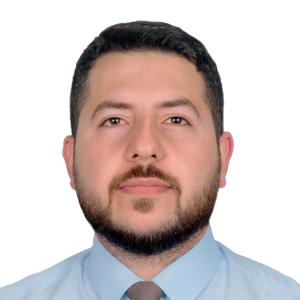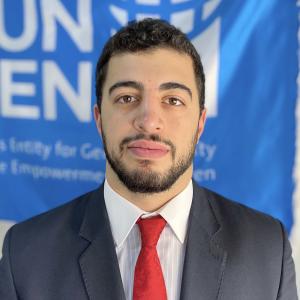Iraq stands up for the environment at COP 27, UN climate change conference
06 November 2022
Baghdad, Iraq, 05 November 2022 – More than 200 Iraqis representing government, youth and civil society are participating in COP27, the 27th annual United Nations Conference on Climate Change, organized by the United Nations in Sharm El-Sheikh, Egypt.
Climate change is a reality in Iraq, and a priority for the UN family in the country. It has devastating impacts on the lives of all Iraqi citizens, especially the poorest and most vulnerable, and the urgency for action crosses all political, ethnic, social and geographic lines.
The Iraqi delegation to the 6-18 November 2022 COP 27 includes representatives from the government, youth, civil society and private sector.
“Iraq is at the frontlines of the climate crisis and one of the countries in the world most vulnerable to climate change, while its citizens suffer from the devastating impacts of heat waves, sand and dust storms, flash floods, droughts, land degradation, inundation due to sea level rise and water scarcity,” said Resident Coordinator Ghulam Isaczai, adding, “UN Iraq will continue working every day to show that climate commitment is about action, coordinated solutions and engagement at all levels.”
The work of UN entities in Iraq takes into consideration the environmental impact of climate change, with a focus on ensuring that actions and projects are environmentally friendly and prioritize the most vulnerable communities, including women, children, young people, and persons with disabilities.
On the ground, in Kirkuk, the UN initiated a tree-planting campaign to raise awareness about climate action and expand the 'Green Belt' to mitigate dust storms. UN-Habitat Iraq created nearly 12 hectares of public green spaces so far and planted over 5,000 trees to reduce the impact of sandstorms.
UNDP supported the Government of Iraq to develop and ratify climate change policy through the Nationally Determined Contribution (NDC) that addresses both mitigation of greenhouse gasses and adaptation towards climate change, with a focus on gender and the private sector, and continues to provide capacity development and piloting of projects to support the implementation of the NDCs.
FAO continues to enhance climate resilience of vulnerable agriculture households in Iraq’s rural areas in partnership with the relevant governmental institutions and renews its commitment to continue supporting the local communities, including buffalo producers in the Marshes. FAO is also promoting climate-smart agricultural practices to address water scarcity, heat and drought under projected climate change scenarios, preventing food loss and waste, and addresses the degradation of valuable natural resources such as soil and water, in addition to supporting with near real time remote sensing data to monitor land and water productivity.
In the past two years, over 1.5 million Iraqi people gained access to safely managed water services, and a half million gained access to safely managed sanitation services through UNICEF’s work with the national authorities. UNICEF is asking national stakeholders to take rapid action to protect every child and young person by providing critical services, prepare them by building their capacity, and prioritize children and young people in climate funding and resources.
UNWomen will use COP 27 to underline how gender equality can strengthen climate action and mitigate impacts as well as highlight women’s voices and leadership as a key driver of climate change successes. It will leverage strengthened global commitment to increasing and ensuring a more gender-equal approach towards climate, environment, and disaster risk reduction. Additionally, the UNFPA Iraq Country Office is working jointly with the Ministry of Environment and Ministry of Planning to develop a study on the impact of climate change on women/girls as well as vulnerable groups in Iraq.
WFP has supported smallholder farmers with adaptation measures and the Ministry of Water Resources with pilot projects for modern irrigation systems. WFP is also funding climate change mitigation and adaptation actions for reforestation, mangrove planting and marshland conservation. WFP is also working with the government to develop early-warning systems to trigger action before extreme weather events impact vulnerable families, allowing them to take preventive action.
At COP 27, IOM draws on its extensive research to highlight water scarcity in Iraq, which destroys agricultural livelihoods and drives internal displacement from rural to urban areas – areas that already struggle to provide basic services to residents and where social tensions continue to rise. This growing displacement will have a disproportionate impact on persons with disabilities, who already face social marginalization, difficulty finding employment and higher barriers to accessing services. Informal settlements (where climate migrants typically end up living) and poor quality roads create significant barriers for their freedom of movement, independence and quality of life.
Let’s all work together towards building a sustainable Iraq and end the environmental crisis!
Ghulam Mohammad Isaczai, Deputy Special Representative, Resident and Humanitarian Coordinator for Iraq
Dr. Salah ElHajjHassan, FAO Representative in Iraq
Giorgi Gigauri, IOM Iraq Chief of Mission
Zena Ali-Ahmad, UNDP Representative in Iraq
Dr. Rita Columbia, UNFPA Representative in Iraq
Wael Ashhab, Head of UN-Habitat Iraq
Sheema SenGupta, UNICEF Representative in Iraq
Dina Zorba, UNWomen Representative to Iraq & Yemen
Ally Raza Qureshi, WFP Representative to Iraq



Miguel Mateos Muñoz

Mohammed Al-Bahbahanee

Musab Othman




